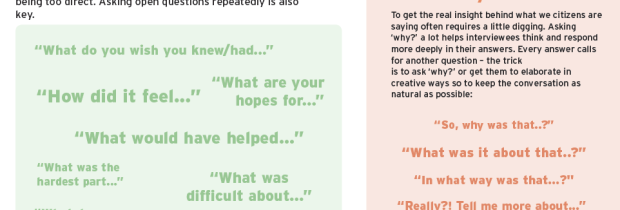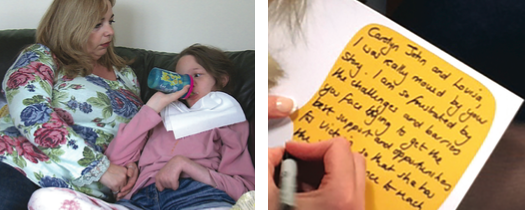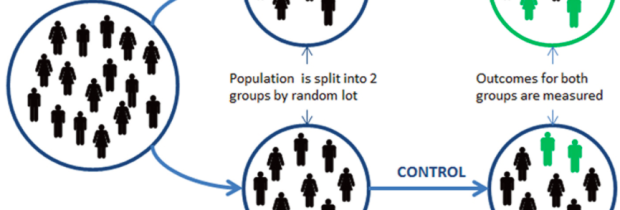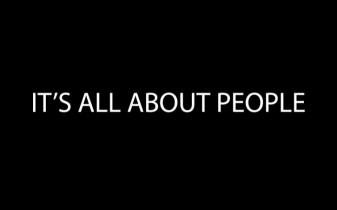What do you learn from people with learning disabilities if you really listen? “Walk in our shoes!” was the challenge we heard from spending time with some inspirational folk down in Croydon….
“What is this life, if full of choice
If you take control, and we have no voice?”
Why haven’t we changed the world yet? Perrie, Sophia Looney (Director of Customer Services at Essex County Council) and I had the privilege of giving a paper at last week’s Service Design in Government Conference, in which we explored the learning from Essex, and shared some of our tools and approaches to shifting those all-important system conditions…
“The actual coproduction IS part of the recovery process for service users. It’s not an add-on: ‘Well, we’ve got a couple of service users we’ve brought in, and we’ve given them a bit of training, and we can now tick that box to say we are working with them‘. It has to go much, much deeper than that.”
ThePublicOffice has helped Essex County Council (ECC) to run a micro-grant scheme in libraries. The scheme borrows from popular challenge prize methods, but keeps things stunningly simple. The value created for the money spent has exceeded everyone’s expectations. ECC’s experience shows that anyone might run an effective challenge programme with a modest budget and lean operational support, provided a few important principles are kept in mind. Learn more about.
Are you passionate about helping people to do things for themselves? Does the notion of co-production and recovery excite or intrigue you? Do you run a social enterprise? Are you a digital guru? An innovator working across Essex? Or perhaps all of the above? If so you might be interested in an immersive workshop on 29th January, in Chelmsford, Essex. A bit of background During 2016, Essex County Council (ECC).
TPO at ‘Service Design in Government’ event – 9-11 March 2016 Ruth Kennedy and Perrie Ballantyne will be presenting a case study of ThePublicOffice’s ongoing work with Essex County Council at the upcoming ‘Service Design in Government’ Event in London, in March 2016. ThePublicOffice has been embedded in Essex County Council for 2.5 years, supporting work across health and social care (including early years, working age adults with disabilities, dementia,.
“Co-production is what the Recovery College is based on – the ethos runs through the whole process. We encouraged people to share, and we shared ourselves too – talking about our lives and our experiences. People lost their mental health identity and became just people. I didn’t feel like a clinician. It’s very different to what I’ve experienced in mainstream services.” (Former Manager, Recovery College) ‘’I’ve realised that I have.
Consultation. Public Engagement. Codesign. Coproduction. These are not the same thing (and differentiating between them is vital in order to really do what it is you need to do, for the circumstances you’re in). But the critical importance of getting better at listening to and communicating with the public – whether for formal consultation (big C) purposes or more creative codesign – needs our attention. In this post, the wonderful @lesteph.
Is outcomes-based commissioning really happening (yet)? Are we equipped to actually do it?
In our document Listening, Learning & Telling Stories we make clear that it’s absolutely NOT ‘all about ethnography’. But ethnographic approaches, broadly defined, have been a key catalyst for innovation in the work we’ve been supporting in Essex. Want to know more? This is a cool little film made by our friends and partners Esro.
Read – Listening, Learning & Telling Stories – a new publication in which we share what’s been happening so far in our work to support radical new approaches to citizen engagement in Essex.
The wonderful @TessyBritton brought my attention to this article by Dr David Halpern, CEO of the Behavioural Insights Team, on the rise of the What Works Centres (WWC). The rise in appetite for evidence in public policy is long overdue, and hugely welcome in terms of designing for delivery of improved outcomes for (with) the public. So we’re watching the work and influence of the WWCs with great interest. But..
My friend Sophie is on a Back to Nursing course. It’s horrible, on many levels. “It’s almost like you have to lower your expectations to fit in, which I suspect is what the patients do every day. Isn’t that terrible?”
Yesterday the TPO team spent the day together at Ruth’s place in Peckham. Today I am back at my desk ploughing through the actions we agreed at our meeting, plus a whole load of other stuff, and I’ve found myself reflecting on just how special it is to be working with these guys (none of whom are actually, well, guys).
Today Ruth is taking part in a conversation, led by the Young Foundation and attended by a host of people we like and admire, to explore the ‘purpose and promise of social innovation and its role in tackling inequality at the heart of the new public work’.




